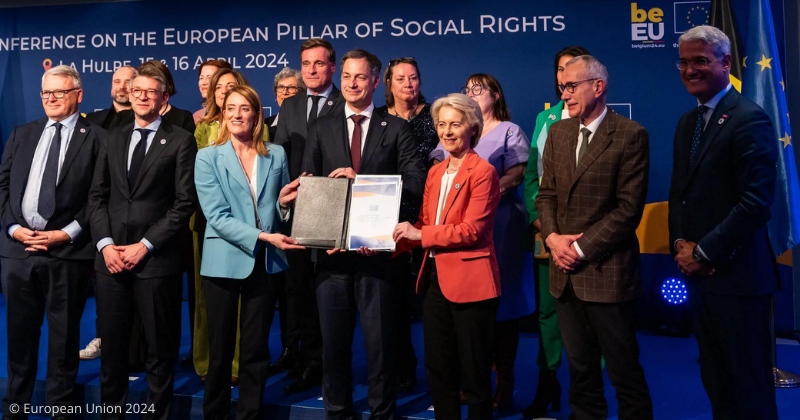La Hulpe Declaration: a strong commitment to social Europe and lifelong learning

Background
More than six years have passed since the Gothenburg meeting, when the adoption of the European Pillar of Social Rights marked a formal step to recognise the invaluable social dimension of the European Union and its willingness to treasure and strengthen social rights across the continent. Its very first principle states that:
Everyone has the right to quality and inclusive education, training and life-long learning in order to maintain and acquire skills that enable them to participate fully in society and manage successfully transitions in the labour market.
The conference
On 15-16 April 2024, the Belgian Presidency of the Council of the EU convened the High-Level Conference on the European Pillar of Social Rights to take stock of the progress made through the Action Plan and to further highlight its crucial dimensions in the light of the Green and Digital Transitions. Highest-level decision-makers agreed that the Pillar will continue to address employment, skills and social challenges at national and EU level. At the end of the conference, a Declaration on the Future of the European Pillar of Social Rights - dubbed “La Hulpe Declaration” from the name of the town near Brussels where the conference took place - was adopted.
The declaration
As far as education and training are concerned, the Declaration praises the role of lifelong learning in societies and acknowledges that “further actions promoting a mindset of lifelong learning are needed“, especially in light of the current skills shortages. In particular, it stresses that “the right to quality and inclusive education, training and lifelong learning as set out in Principle 1 of the European Pillar of Social Rights is essential to help all working, unemployed and inactive people and upholding this right requires action”. This points to the invaluable benefits that lifelong learning - and adult education - brings even to marginalised segments of our population, enabling them to actively participate in society.
Signatories also underlined “the importance of innovative and quality education and training for all. We welcome the momentum created by the European Year of Skills and commit to keeping skills as a policy priority and to updating the Skills Agenda”.
Moreover, the declaration calls for an empowerment of social partners and collective bargaining, while acknowledging the significant role of civil society, especially in addressing social exclusion and inequalities.
The future
A key takeaway from the conference is that a review of the European Pillar of Social Rights Action Plan is due in 2025; this will allow for further actions, as called upon in the declaration, to achieve the 2030 EU and national targets for employment, skills and poverty reduction. The implementation of the Pillar is generally well received in EU Member States, and this conference and the consequent declaration are a good reminder that, for Europe, a social model that cares for its citizens and caters for their needs also through lifelong learning, is essential.




Kommentarer